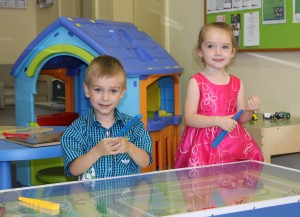
Talking Matters has an ongoing commitment to the speech pathology profession and to the families of children with communication difficulties both now and in the future.
One way we can help support speech pathology to continue to meet the needs of children with communication difficulties is to support the training of speech pathology students. As well as benefiting students and the profession, working with students has benefits for our team’s ongoing professional development as well as for clients and families.
How does Talking Matters work with speech pathology students?
We currently offer two different placements to speech pathology students from Flinders University.
- Observations for first year students
- Clinical placements for final year students
Observations for first year students:
First year students are just beginning their speech pathology journey. As a part of their training they do observations in a range of settings to find out about the varied roles of speech pathologists in different workplaces. At Talking Matters they are offered a half day observation in which they watch some clients work with their regular therapist and have the opportunity to see our facilities, meet our staff and ask questions about our services. Clients are carefully selected to ensure the presence of the student does not interfere with the child’s therapy. Observations are not offered when the session is complex or if the regular therapist feels the child will be distracted or concerned about an unfamiliar person being present. Parents are informed of the observations and may choose for their child to not be observed if they wish.
Placements for final year students:
These placements are for a small number of students who attend a number of days per week for a whole semester. With the support of the clinicians from Talking Matters they conduct assessments and therapy with children and work alongside families to develop their child’s communication skills. Final year students have already completed a number of years of university training and have done other supervised placements. Clients are selected by their regular therapist as being suitable for working with a student. The client’s regular therapist assists the student to plan any therapy, observes the session, checks any documentation and gives the student feedback. As the regular therapist is in the room with the child and student they will step in and provide support when needed.
How can working with students be of value to my child?
Some of the benefits of working with students include:
Access to cutting edge information and resources. Students learn the most recent theory and techniques and bring this up to date information with them to the therapy setting.
A fresh approach. Students bring with them a fresh point of view and a great level of energy and enthusiasm. As they carry a small caseload they can give each client special attention.
New resources and activities. Part of the student’s responsibility is to develop new resources. With a smaller caseload they are able to tailor these to the needs and interests of their individual clients.
New communication opportunities. A new face in the room means new opportunities to communicate and broaden a child’s social circle which can have positive benefits on communication skills. Many children love to have someone new to share their skills with.
What else do I need to know?
- Your permission will always be requested before a student is involved with your child. Should you wish to refuse, your decision will be respected.
- Your child is our first priority. Your regular therapist will only suggest your child work with a student if they feel this will not have a negative effect on your child’s progress.
- Your child’s regular clinician will be present at all times and has responsibility for your child’s therapy.
- All students have undergone a recent police check and are bound by rules of confidentiality.
The Talking Matters team looks forward to having a great partnership with our allocated students!
Related Blog Posts
If you liked this post you may also like:
Using TRAPPED PENGUIN To Grow (part 2)
Create and learn
Holiday recounts
What is Dyspraxia?



